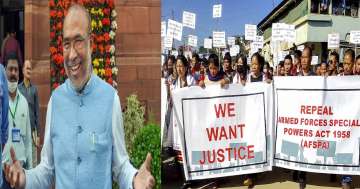‘BJP retains power’ to ‘relaxation in AFSPA and liquor ban’- Manipur witnessed mixed bag of events in 2022
The year 2022 very eventful for Manipur as the state witnessed the high-stakes assembly election in which the ruling BJP retained power and AFSPA was partially removed from the state.

As the stage is set for embracing the new year 2023, let’s recap the top events that happened in the Northeast state Manipur. Year 2022 was a mixed bag of events for the state. The year was eventful as the controversial AFSPA and liquor prohibition, imposed for many years, were partially lifted even as the BJP under Chief Minister N Biren Singh retained power in a high-profile assembly election.
However, tragedy struck Manipur as 58 people, including 29 army jawans, lost their lives as a massive landslide hit the under-construction Tupul railway yard in Noney district, in one of the worst natural disasters in the northeastern state.
Assembly election battle: Debacle for Congress
A record turnout of 90.28 per cent was witnessed in polling to 60 assembly seats in two phases on February 28 and March 5.Prime Minister Narendra Modi and Union Home Minister Amit Shah campaigned in the state, urging people to vote the BJP to power again “to secure Manipur’s future for the next 25 years”. The saffron party made history in the polls, bagging 32 seats, 11 more than its tally in the 2017 elections when it had formed the government in the northeastern state for the first time. The Congress, on the other hand, performed poorly, winning only five seats, down from 28 in the previous polls. Many Congress heavyweights, including former deputy chief minister Gaikhangam Gangmei and the then party state chief N Loken Singh, suffered a stunning defeat.
Janata Dal (United) and National People's Party (NPP) put up a good show, winning six and seven seats respectively, while Naga People's Front (NPF) bagged five seats and newly formed organisation Kuki People's Alliance bagged two.
JD(U), however, suffered a setback as five of its six legislators quit the Nitish Kumar-led party and joined the BJP in early September.
Despite the BJP’s clear majority, all non-Congress parties except the saffron outfit’s former ally NPP, extended support to the new government. The BJP legislature party unanimously elected Biren Singh as its leader after suspense of 10 days following the declaration of results on March 10.Singh took oath as the chief minister for the second term on March 21. Several key decisions were taken in the first year of the second term of the BJP government in the state.
Partially victory for anti-AFSPA protesters
The Ministry of Home Affairs on March 31 removed the Armed Forces (Special Powers) Act, 1958 from the jurisdiction of 15 police stations in six districts of Manipur.
The move was welcomed by all quarters but the NPF and the Congress demanded the withdrawal of AFSPA from across the state. The partial withdrawal of the controversial Act did not cover Naga or Kuki inhabited districts. The Act, labelled as “draconian” by rights activists, gives extraordinary power to security forces to search premises, arrest without a warrant, in areas declared as “disturbed”. BJP’s ally NPF said its movement was for the removal of AFSPA from the entire Northeast and not just specific areas, while Congress said the partial withdrawal was but a beginning, while demanding removal of the legislation from all of Manipur.
In June, the state Cabinet gave its nod to adopt 1961 as the base year for determining “native” status of people for effective implementation of Inner Line Permit (ILP) in Manipur. ILP came into force in the state on January 1, 2020 after years of demand by various social organisations.
Massive landslide claimed 58 lives
Tragedy struck the state at midnight on June 30 when a massive landslide occurred at Tupul railway yard on the under-construction Jiribam-Imphal line. Fifty-eight people, including 29 army jawans of the 107th Territorial Army, were killed in the incident and 18 others were injured. The National Disaster Response Force and State Disaster Response Force were deployed and the intense rescue operation was finally called off on July 20.
Ethnic tensions prevailed
Ethnic tensions too flared up in August, after the All Tribal Students’ Union Manipur (ATSUM), the apex body of the state’s tribal students, imposed an economic blockade on the highways of the landlocked state demanding tabling of the Manipur (Hill Areas) Autonomous District Council Bill, 2021, which could give greater administrative autonomy to the hill areas of the state. The administration suspended mobile internet services across the state for several days after a vehicle was set ablaze in Bishnupur district.
On the other hand, Meitei Leepun, a Valley-based civil body, locked the Imphal office of ATSUM claiming that the blockade was aimed at inconveniencing the residents of the Valley.
Mobile internet services were restored after the situation gradually came back to normal.
Partially relaxation in liquor ban
The state government took a bold move in September, lifting the prohibition on the manufacture and sale of liquor from specific areas to boost revenue and prevent the consumption of illicit liquor. The prohibition was lifted from district headquarters, hotels with at least 20-bed lodging facilities and security camps, while transportation of liquor required production of a receipt.
The move evoked mixed reactions, with certain sections expressing happiness, while others such as social bodies Coalition of Drugs and Alcohol (CADA) and Nupi Samaj, condemning the move and periodically organising sit-in demonstrations demanding the revocation of the decision.
Several insurgents also surrendered before the chief minister during the year. In November, 31 militants from five outfits laid down their arms, while 14 insurgents of another organisation surrendered in June.
(With PTI input)
Also Read: Top 10 Modi-moments 2022: When PM won the hearts of people